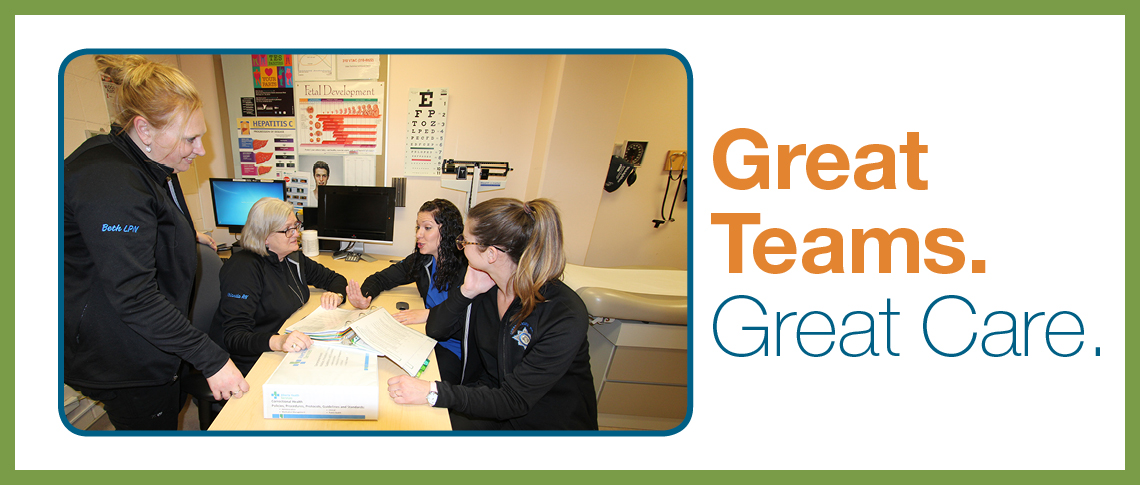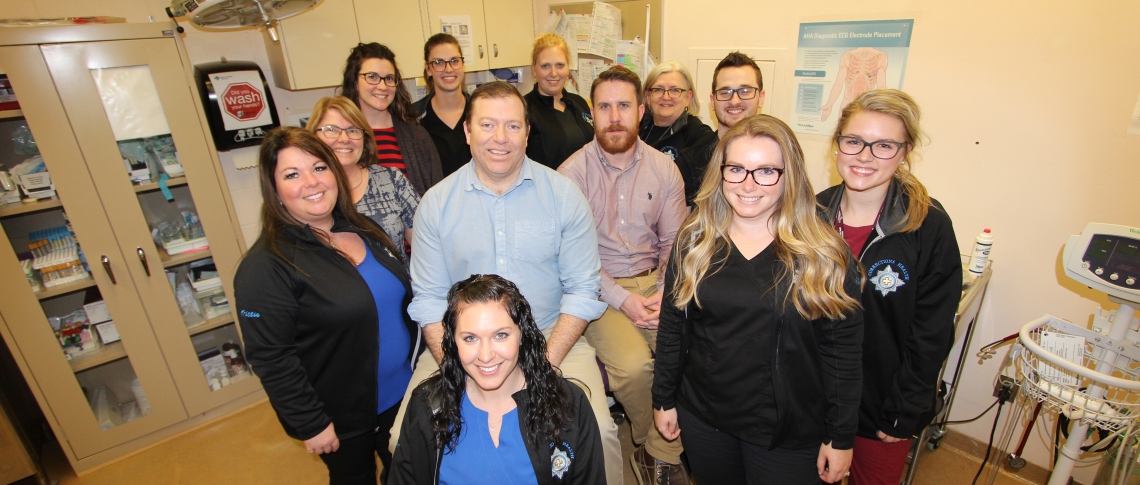

The AHS Correctional Health team at the Lethbridge Correctional Centre (LCC) brings health services to inmates serving sentences under two-years, or those held in remand, awaiting their next court date. For many, it will be their first time receiving care.
“People in this high-risk and marginalized population often come from situations where they don’t typically seek medical care,” says Jordana Schmitz, Nurse Clinician on the LCC team. “They’re focused on needs such as food, shelter and clothing. Those with mental health and addictions issues may be suspicious of seeking care.”
AHS correctional health teams work in provincial correctional centres like LCC, to improve the overall health of inmates by providing care, support, treatment, referrals and mental health and addictions counseling.
“Often, the people we treat have complex health issues,” says Schmitz. “During their incarceration, we reach out and help them gain control of their health.”
Schmitz finds her patients open to receiving health information and treatment. Her associate Evelyn Cox agrees. She’s an RN specializing in sexual health education.
“I find them receptive, grateful and cooperative 99.9 per cent of the time,” says Cox. “By providing healthcare services for them at an opportune moment (while incarcerated), I feel like I am doing something important and worthwhile that may not happen otherwise."
Cox works at the prison once a week, to educate clients about sexual health, help screen for sexually transmitted infections and do pre- and post-test counseling. She appreciates that the healthcare team and Corrections Officers welcome her with open arms.
“They‘re fantastic to work with, and make it possible for me to do my job.” says Cox.
LCC has a secure eight-bed infirmary, set up as individual cells. Clinics are held on site, and supervised off site diagnostics and treatment referrals are also available, if medically required. Inmates fill out health services requests to access care.
“To understand how we operate, think of Corrections Health as a rural acute-care facility,” says Schmitz. “We manage whatever health needs walk through the door.”
Kristie Knoll, Health Services Manager, says it takes the skills and talents of a diverse group of health professionals to satisfy the broad needs of a patient group that varies in age, gender, backgrounds, length of stay and degrees of health.

The LCC team includes RNs, LPNs, a Registered Psychiatric Nurse, a service worker and admin support as well as a psychologist, and addictions counselor. A team in Edmonton provides pharmacy support; other provincial health specialists are called upon as needed. A doctor visits twice a week, and a weekly clinic gives access to dental care and other healthcare providers.
“Telehealth helps extend our team resources,” explains Schmitz. “For example, a Calgary-based psychiatrist can meet with inmates, using this technology.”
Schmitz points out that the security aspect of the job is the biggest difference–they are always on camera or supervised.
“We work closely with Alberta Justice and the Solicitor General’s office, and rely heavily on the Correction Officers in our day to day work. They’re a big part of our team. They keep us and the inmates’ safe and are either close-by or with us if there is a risk.”
It takes a different “lens” to work in Corrections Health, adds Schmitz.
“You have to be open-minded and put biases aside — being professional and self-aware is key,” says Schmitz. “You treat everyone equitably, regardless of why they’re here.”
Schmitz sees her patients as “just people who have made a mistake” and appreciates that many have had a hard life.
“While they’re here with us, we can reach out and help, but have to measure our successes a bit differently,” says Schmitz. “Perhaps they’ll have an improvement in staying clean and sober, longer. Perhaps they’ll finally get the surgery they need while incarcerated, after several no-shows on the outside.”
As their sentences end, the team helps people transition into the community and access resources to help them manage their health issues. There’s hope that they will.
“Corrections Health is a hidden gem,” adds Schmitz. “While it may not be for everyone — most will know the first day if it’s a fit — those who enjoy this work usually have lengthy, satisfying careers working with a loyal, cohesive team in an interesting environment helping people who need our support.
“We're a great team providing exceptional care,” says Knoll. “I’m proud of what we’ve accomplished. We’re changing lives, and the work we do not only helps our patients — but makes a difference in Canadian society and within AHS.”